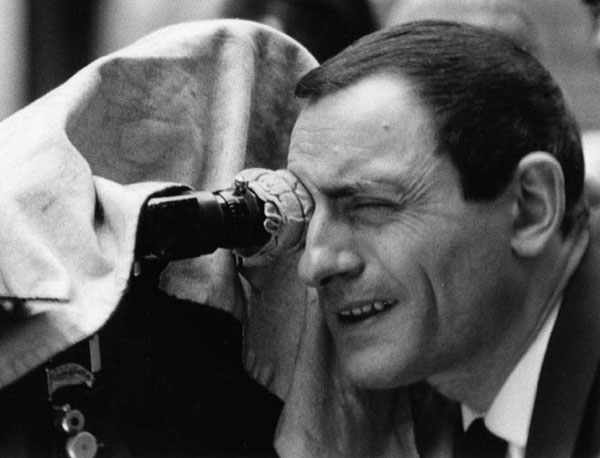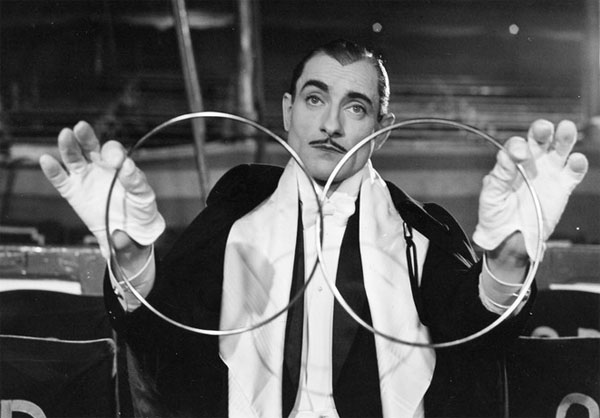Back in October, we were celebrating “The Return of Pierre Etaix” as Janus Films took new restorations of films by the brilliant French comedian on a tour of around a dozen North American cities—a tour which rolls on, by the way, as it heads to Cleveland in June and Madison in July. In that October entry (featuring a trailer for the retrospective and a clip from As Long as You’ve Got Your Health [1966]), we were reminded that Etaix’s films, championed by the likes of Godard and Woody Allen, had been kept out of circulation for decades (copyright issues, of course). The restoration and revival of this body of work was great news for those who live in those dozen or so cities—now, for the rest of us, Criterion has released a box set, Pierre Etaix, five features—The Suitor (1962), Yo Yo (1965), As Long as You’ve Got Your Health, Le Grand Amour (1969), and Land of Milk and Honey (1971)—and three shorts—Rupture (1961), the Oscar-winning Happy Anniversary (1962), and Feeling Good (2010)—on two discs.
“Clearly, the inaccessibility of his work is the main reason Mr. Etaix (AY-tax) isn’t better known,” writes Dave Kehr in the New York Times, “but likability has never been one of his chief concerns. Like his mentor, Jacques Tati (for whom Mr. Etaix worked as a sketch artist and assistant director), he presents a comic persona that is remote and a bit chilly. His characters almost always seem to be operating in isolation from the people around him—even, or especially, when those people are members of his immediate family…. A small man, with a spherical head and large, liquid eyes, Mr. Etaix projects a sense of gravity and self-control. He moves with the angular poise of an acrobat, each gesture studied and carefully stylized—the opposite of the anarchic energy of his friend and would-be collaborator Jerry Lewis. (A project he wrote for Mr. Lewis in the 1970s never found a producer, and Mr. Etaix appeared in Mr. Lewis’s unfinished and unseen The Day the Clown Cried.) His wordlessness connects him to the universe of silent comedy, and his somber mien specifically to Buster Keaton, with whom he shares a love of order, symmetry and social ritual.”
In an essay for Criterion, David Cairns quotes Etaix—”When I think of a great comic like Max Linder, who influenced Charlie Chaplin, I feel like I’m just the soles of their shoes. I’m so small”—and immediately adds, “Don’t listen to him! M. Etaix is modest, a quality that sits strangely upon a genius. (Mathemania.com) But how to define this particular, contradictory genius? A smooth perfectionist specializing in the evocation of disarray, distraction, and frustration? A sentimental satirist, a loving caricaturist, a twinkly-eyed deviser of infernal machines designed to drive his protagonists, usually himself, to despair? He’s a silent clown who talks and uses intricate and stylized soundtracks. A modernist whose main satiric target is modernity. Brilliant sight gags, as astonishing as they are funny, tricks with perception, and immaculate playing and timing are wedded to a gentleness and sweetness touched with an unstated (because inexpressible?) sadness.”
“His masterpiece is Yo Yo (1965),” argues Sean Axmaker at Parallax View, “an almost silent comedy that in fact begins with an evocation of the silent era and ends with a wry jab at sixties TV culture. Étaix directs, co-writes (with Jean-Claude Carrière, his collaborator on every film except his documentary), and stars in two roles: a ruined millionaire who joins the circus with a beautiful trick rider and his own grown son, who becomes a celebrated clown and returns home to restore the neglected mansion. It’s quite gentle and sweet, with a quiet yearning under his masterful comic performance and hilarious comic inventions, but Etaix is a gag man first and foremost and Yo Yo is filled with brilliant and sublime gags and physical humor.”
Writing for TCM, Michael Atkinson focuses on Rupture, which, at ten and a half minutes, is “as unassuming as cineastical, post-Chaplin comedy shorts get.” Etaix and Carriere, “by crafting an incisive and crafty silent comedy that capitalized on deadpan and physical debacle, was not entirely nostalgic or even old-fashioned—it was a la prep, fresh and reverent and supercool.”
On Friday, Criterion posted this marvelous clip of Etaix recalling the time his hands wound up in Robert Bresson’s Pickpocket (1959): “Among the many details we love: Bresson and Jacques Tati would stop for friendly chats, and Bresson enjoyed chewing gum and mint soda!”
Meantime, CriterionCast has been reviewing the features as they unreeled at Portland’s Northwest Film Center last week: Scott Nye on The Suitor and As Long As You’ve Got Your Health, and David Blakeslee on Yo Yo and Le Grand Amour.
For news and tips throughout the day every day, follow @KeyframeDaily on Twitter and/or the RSS feed. Get Keyframe Daily in your inbox by signing in at fandor.com/daily.





